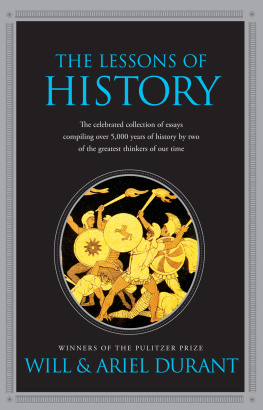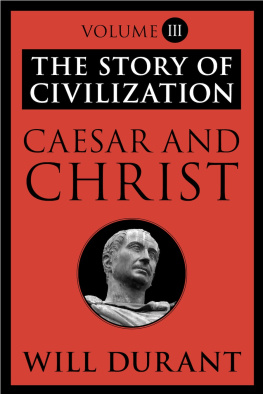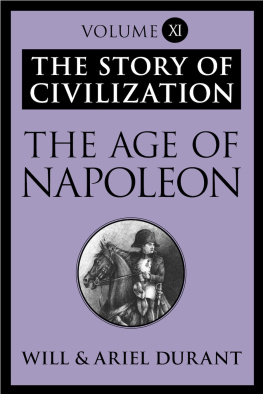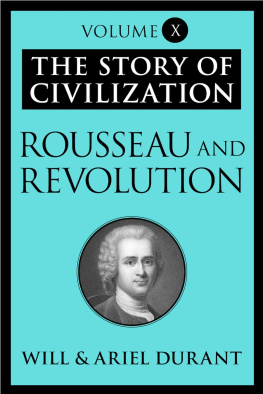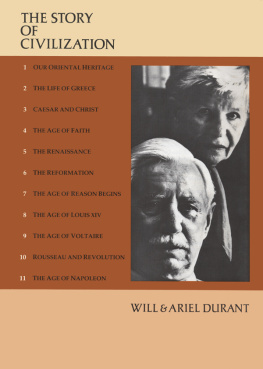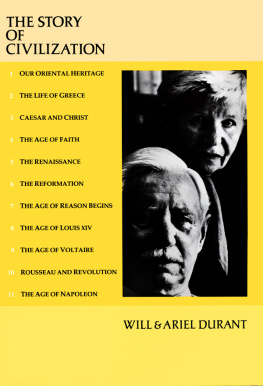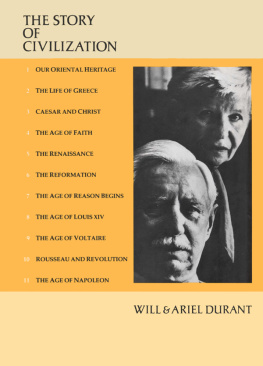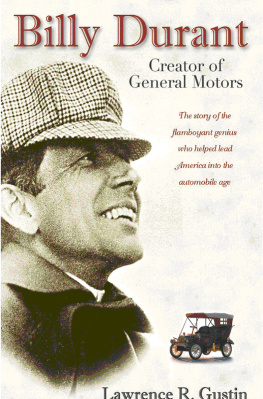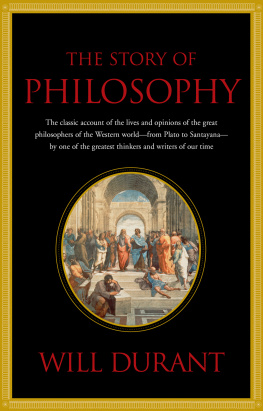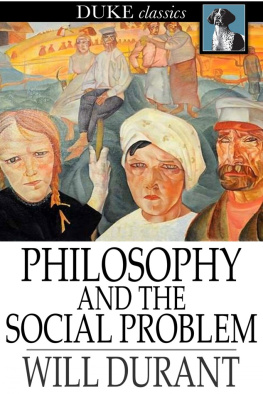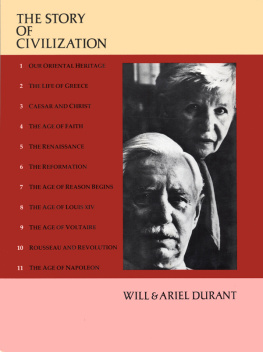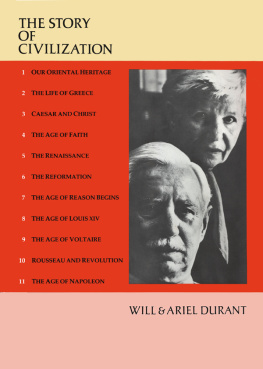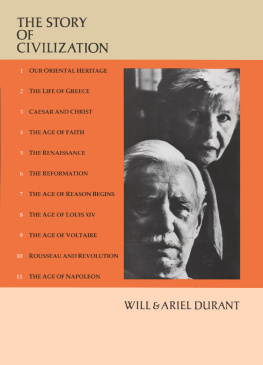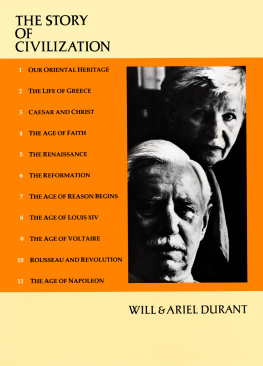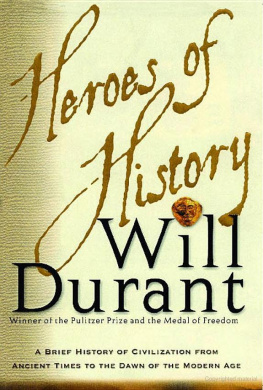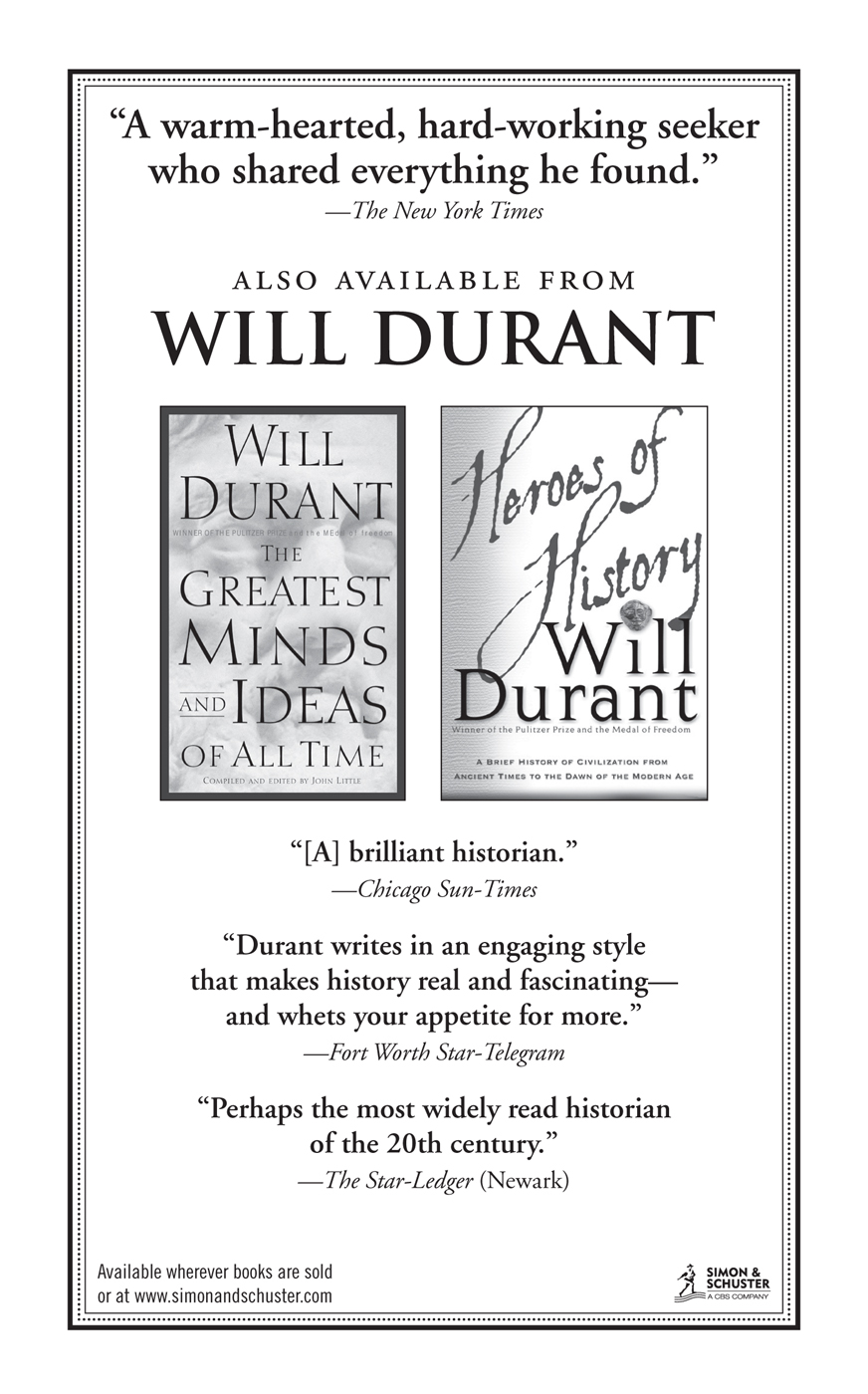BY WILL DURANT
The Story of Philosophy
Transition
The Pleasures of Philosophy
Heroes of History
The Greatest Minds and Ideas of All Time
THE STORY OF CIVILIZATION
I. Our Oriental Heritage
II. The Life of Greece
III. Caesar and Christ
IV. The Age of Faith
V. The Renaissance
VI. The Reformation
ALSO BY WILL AND ARIEL DURANT
VII. The Age of Reason Begins
VIII. The Age of Louis XIV
IX. The Age of Voltaire
X. Rousseau and Revolution
XI. The Age of Napoleon
A Dual Biography
We hope you enjoyed reading this Simon & Schuster eBook.
Sign up for our newsletter and receive special offers, access to bonus content, and info on the latest new releases and other great eBooks from Simon & Schuster.
C LICK H ERE T O S IGN U P
or visit us online to sign up at
eBookNews.SimonandSchuster.com
Thank you for purchasing this Simon & Schuster eBook.
Sign up for our newsletter and receive special offers, access to bonus content, and info on the latest new releases and other great eBooks from Simon & Schuster.
C LICK H ERE T O S IGN U P
or visit us online to sign up at
eBookNews.SimonandSchuster.com
WILL and ARIEL DURANT , after spending over fifty years completing the critically acclaimed series The Story of Civilization, were awarded the Pulitzer Prize for General Nonfiction in 1968. In 1977, the Durants were presented with the Presidential Medal of Freedom. Champions of human rights and social reform, the Durants continue to educate and entertain readers the world over. For more information on their work, visit www.willdurant.com.

MEET THE AUTHORS, WATCH VIDEOS AND MORE AT
SIMONANDSCHUSTER.COM
THE SOURCE FOR READING GROUPS
COVER ART AJAX DEFENDING THE GREEK SHIPS AGAINST THE TROJANS, REPRODUCTION OF A GREEK VASE (COLOUR LITHO) BY ENGLISH SCHOOL (20TH CENTURY) PRIVATE COLLECTION/ ANCIENT ART AND ARCHITECTURE COLLECTION LTD./THE BRIDGEMAN ART LIBRARY

Simon & Schuster Paperbacks
A Division of Simon & Schuster, Inc.
1230 Avenue of the Americas
New York, NY 10020
www.SimonandSchuster.com
Copyright 1968 by Will and Ariel Durant
Copyright renewed 1996 by Monica Ariel Mihell and Will James Durant Easton
All rights reserved, including the right to reproduce this book or portions therof in any form whatsoever. For information, address Simon & Schuster Paperbacks Subsidiary Rights Department, 1230 Avenue of the Americas, New York, NY 10020.
This Simon & Schuster trade paperback edition February 2010
SIMON & SCHUSTER PAPERBACKS and colophon are registered trademarks of Simon & Schuster, Inc.
The Simon & Schuster Speakers Bureau can bring authors to your live event. For more information or to book an event, contact the Simon & Schuster Speakers Bureau at 1-866-248-3049 or visit our website at www.simonspeakers.com.
Library of Congress Cataloging-in-Publication Data
Durant, Will.
Lessons of history / Will & Ariel Durant.
p. cm.
Originally published: 1968.
Includes bibliographical references and index.
1. HistoryPhilosophy. I. Durant, Ariel. II. Title.
D16.8.D84 2010
901dc22 2009016081
ISBN 978-1-4391-4995-9
ISBN 978-1-4391-7019-9 (ebook)
This postlude needs little preface. After finishing The Story of Civilization to 1789, we reread the ten volumes with a view to issuing a revised edition that would correct many errors of omission, fact, or print. In that process we made note of events and comments that might illuminate present affairs, future probabilities, the nature of man, and the conduct of states. (The references, in the text, to various volumes of the Story are offered not as authorities but as instances or elucidations so come upon.) We tried to defer our conclusions until we had completed our survey of the narrative, but doubtless our preformed opinions influenced our selection of illustrative material. The following essay is the result. It repeats many ideas that we, or others before us, have already expressed; our aim is not originality but inclusiveness; we offer a survey of human experience, not a personal revelation.
Here, as so often in the past, we must gratefully acknowledge the help and counsel given us by our daughter Ethel.
WILL AND ARIEL DURANT
As his studies come to a close the historian faces the challenge: Of what use have your studies been? Have you found in your work only the amusement of recounting the rise and fall of nations and ideas, and retelling sad stories of the death of kings? Have you learned more about human nature than the man in the street can learn without so much as opening a book? Have you derived from history any illumination of our present condition, any guidance for our judgments and policies, any guard against the rebuffs of surprise or the vicissitudes of change? Have you found such regularities in the sequence of past events that you can predict the future actions of mankind or the fate of states? Is it possible that, after all, history has no sense, that it teaches us nothing, and that the immense past was only the weary rehearsal of the mistakes that the future is destined to make on a larger stage and scale?
At times we feel so, and a multitude of doubts assail our enterprise. To begin with, do we really know what the past was, what actually happened, or is history a fable not quite agreed upon? Our knowledge of any past event is always incomplete, probably inaccurate, beclouded by ambivalent evidence and biased historians, and and perhaps some young doctor of philosophy in physics would now add that his science has changed more since 1909 than in all recorded time before. Every yearsometimes, in war, every monthsome new invention, method, or situation compels a fresh adjustment of behavior and ideas. Furthermore, an element of chance, perhaps of freedom, seems to enter into the conduct of metals and men. We are no longer confident that atoms, much less organisms, will respond in the future as we think they have responded in the past. The electrons, like Cowpers God, move in mysterious ways their wonders to perform, and some quirk of character or circumstance may upset national equations, as when Alexander drank himself to death and let his new empire fall apart (323 B.C.), or as when Frederick the Great was saved from disaster by the accession of a Czar infatuated with Prussian ways (1762).
Obviously historiography cannot be a science. It can only be an industry, an art, and a philosophyan industry by ferreting out the facts, an art by establishing a meaningful order in the chaos of materials, a philosophy by seeking perspective and enlightenment. The present is the past rolled up for action, and the past is the present unrolled for understanding Perhaps, within these limits, we can learn enough from history to bear reality patiently, and to respect one anothers delusions.
Since man is a moment in astronomic time, a transient guest of the earth, a spore of his species, a scion of his race, a composite of body, character, and mind, a member of a family and a community, a believer or doubter of a faith, a unit in an economy, perhaps a citizen in a state or a soldier in an army, we may ask under the corresponding headsastronomy, geology, geography, biology, ethnology, psychology, morality, religion, economics, politics, and warwhat history has to say about the nature, conduct, and prospects of man. It is a precarious enterprise, and only a fool would try to compress a hundred centuries into a hundred pages of hazardous conclusions. We proceed.
Next page
